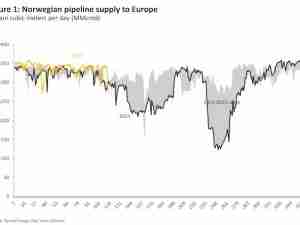European oil refiners set to slow down as profits fall
By: Reuters | Oct 14 2015 at 10:46 AM | International Trade
LONDON - European refiners will likely cut their operating rates in the coming weeks in the face of falling margins, ending a rarely seen strong run of profits, consultancy Wood Mackenzie said on Wednesday.
Benchmark northwest European refining margins <BRT-ROT-REF> dropped this week to their lowest level since July 2014 after diesel prices slumped due to a growing glut in the region as a result of a wave of imports.
Weaker refining margins and operating rates bode badly for Europe’s top oil companies including Royal Dutch Shell, BP and Total, whose sharp drop in profits since oil prices started their rout in June 2014 has been largely cushioned by strong refining earnings.
European refining margins are expected to average $6 a barrel in 2015, the strongest levels in nominal terms since Wood Mackenzie’s records started in 1995, said Jonathan Leitch, the consultancy’s research director for refining and oil products.
But with refining margins declining rapidly, plants are expected to reduce their crude oil processing rates.
Rates in European members of the Organisation for Economic Cooperation and Development will likely fall to around 81 percent of capacity from the current 85 percent, Leitch said.
“Naturally, European refining runs will decrease and some of the refiners will be running at more traditional levels,” he said.
Even increased seasonal demand for heating oil, a higher sulphur content diesel, is unlikely to change the picture significantly, he added.
“Refiners have been running really hard during the summer to meet the very strong gasoline demand and naturally you have diesel coming out too. It seems to us diesel has been a byproduct of gasoline. That gasoil has been building up as excess stock,” Leitch said.
Diesel and gasoil inventory levels in the Amsterdam-Rotterdam-Antwerp hub have climbed to record highs that are testing the region’s storage capacity, leading traders in recent days to seek storage on giant tankers.
Low water levels along the Rhine river <WL-KAUB>, the artery supplying inland markets in Germany, France and Switzerland, have limited barge traffic, aggravating ARA stock builds.
According to Wood Mackenzie, total diesel and gasoil stocks in northwest Europe at the end of 2015 will reach 260 million barrels, the equivalent of 74 days of supply. That compares with stocks reaching 240 million barrels at the end of 2014, or 66 days of supplies.
At the same time, demand for gasoline, which has been the main driver behind this year’s spectacular growth in oil demand around the world, has been gradually ebbing in recent weeks after the end of the peak driving season in the United States.
The picture is not all that gloomy, however.
While European refining margins next are set to drop sharply from 2015, they are still expected to be significantly stronger than previous years due to ongoing global demand for fuels, primarily gasoline, Leitch said.
“Growth is slowing down, but it is not a negative story. Demand is still there and strong.”











